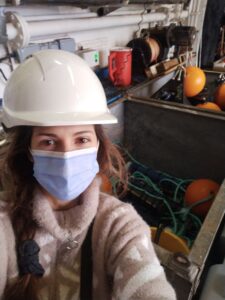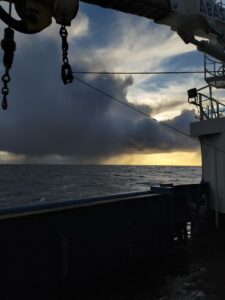Meet the COMPASS Scientists – Susanna Quer on the quest to understand marine mammals presence in North Altantic
The collection of underwater sound data within COMPASS continues into 2021. COMPASS researcher Susanna Quer, who has recently joined Marine Scotland Science and the COMPASS project as it embarks on its last year, has come back from the November survey on board Marine Research Vessel (MRV) Scotia, during which the COMPASS scientific moorings in the Minch and the Sea of Hebrides have been retrieved and redeployed. She explains the work undertaking and conditions experience during this research trip.

“As the daily hours of light decrease, the wind gets colder and the conditions at sea become rougher, undertaking this work during November in the North Atlantic is not an easy task. It is only possible thanks to the immense help provided by the crew and the other scientists aboard this multi-disciplinary research survey. We sometimes refer to these surveys as “cruises”, but this is no cruise, in the vacation sense of the word! This survey is absolutely critical if we want to understand the presence of marine mammals in the area all year round, because the moorings retrieved in November have been listening to the sea since early summer, and the deployment of acoustic equipment during November record the sounds of the ocean and marine mammal presence close to the mooring throughout the winter season”.
“Winter is a time when other types of marine mammal surveys can be limited by daylight and weather. The ability of the devices to stay on for several months at a time allows us to record the sounds and noises of the sea for long periods and during hours of bad weather or darkness, rather than the “snapshots” during hours of daylight permitted by visual surveys. This is particularly relevant during the winter period, a season in which rough weather and short days do not allow scientists to conduct other types of surveys to understand marine mammal occurrence, such as land-based or boat-based visual surveys. Due to the weather, the sea state can make the observation of smaller species (e.g. harbour porpoise) particularly challenging”.

COMPASS moorings are in fact one of the few monitoring programmes within the North East Atlantic to collect data throughout the whole year, which enables us to investigate seasonal patterns in the occurrence of whales and dolphins, helping paint a wider picture of the habitat preferences and distribution of species in the monitored area. Early data from the COMPASS project have shown increasing rates of occurrence during the winter season at four of the ten monitoring locations within the region: Tolsta Head, Stoer Head, the Shiant Isles and Stanton Bank. The data recovered by Susanna during this survey will allow us to expand our data set to cover the June-November period for a fourth consecutive year, the result of a huge effort on the part of the scientists and ship’s crew that lead this work.
For further detail on the location of receivers deployed through COMPASS go to the Marine Mammals (arcgis.com) Story map.
